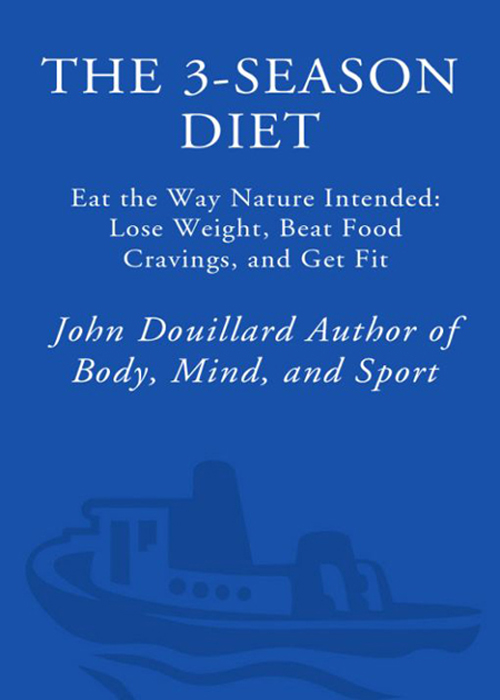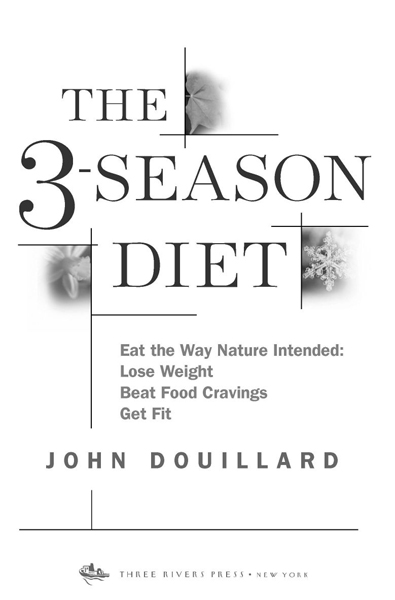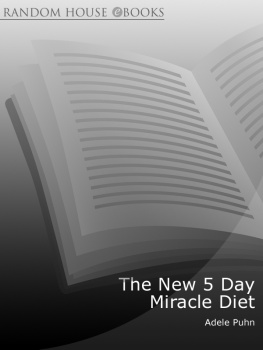

Table of Contents
To My Readers
Do not attempt a weight-reduction or exercise program unless and until you have had a thorough examination and consultation with your physician. As with any diet or exercise program, if at any time during the program you experience any discomfort or serious symptoms consult your physician immediately. If you experience any pain or discomfort during any of the recommended exercises stop immediately and consult your physician.
Acknowledgments
THANK YOU TO ALL my patients and students over the years who have proven time and again to be my best teachers. To my wife, Ginger, and my five children for the constant reminders that family life and love are the most important things. To my biggest fans, my Mom and Dad and my sister, Debbie, and her husband Doug, I feel your love and support everyday.
To Peter Occhiogrosso who had the genius to take my voice and vision and turn it into these printed pages. To my editor, Peter Guzzardi, Tina Constable, and everyone else at Harmony Books, thank you all for making this project so enjoyable. To my agent, Murriel Nellis, thank you for finding Peter Occhiogrosso and for all of your support. To Nancy Azeez, thank you for so generously offering to do such a great job on the illustrations on a moments notice.
Above all, I would like to thank God for... everything!
Preface
OVER MILLIONS OF YEARS of human evolution, nature has figured out how to feed us with astonishing accuracy. The more deeply you study the 3-Season Diet, the more logical and compelling you will find its wisdom. And the proof is in the craving: When you practice this diet, you will crave exactly what nature is about to harvest. You will not experience any struggle or strain, only a growing appreciation of how nature has designed the best diet for balancing weight, mood, and energy for everyone living anywhere on the earth.
In the late 1980s, I went to India to study their natural system of medicine, called Ayurveda. That ancient Sanskrit word means literally the science of life, an in-depth study of nature itself. To the masters who described Ayurveda in the ancient Vedic texts, perfect health was a reflection of a life attuned to the changing cycles of nature and with all plant and animal life. They saw that these cycles, from annual growing seasons to daily rhythms, were connected to the rhythms of the cosmos and influenced every aspect of nature. Because Ayurveda was derived from natural rhythms, its research and proving ground was found in the expression of nature itself. The 3-Season Diet that I am presenting here is based on the Ayurvedic nutritional map, but with some important differences.
After my postgraduate training in Ayurvedic medicine in India concluded in 1989, I returned to the States and started teaching Ayurveda to doctors and lay people. During my years of teaching, I realized that the original Ayurvedic diets, which work for India, dont always fit well in our culture. So I began to apply the concepts and rules I had learned in India to the pace of life and the foods that are available here in the West. I have spent the last 10 years translating Ayurvedic concepts into the American way of life, including diet, exercise, eating habits, and stress-prevention techniquesall of which are included in this book. The deeper I delved into nature and its growing seasons and harvests, the more respect I had for natures wisdom. I discovered that the principles of Ayurveda provide a universal body of knowledge that applies to every culture and each individual in all parts of the world. Although I would not call this an Ayurvedic book, the principles from which the 3-Season Diet is derived have been proven over more than 5,000 years. In fact, I like to think of the 3-Season Diet as an updated version of the original American Diet. It is based on the same logic farmers have been using to feed us since the very first harvest.
PART I
You Can Eat It All
CHAPTER 1
The Diet Dilemma and the Eye of the Hurricane
FOR SOME TIME NOW, the people of the United States have been overweight in record numbers, and the situation is worsening with each decade. In the last 10 years alone, the rate of obesity in this country has increased from one in eight people to one in five! According to the most recent government survey, 55 percent of the adult population97 million peopleis overweight or obese (weighing more than 30 percent over their ideal body weight). As a result, the same survey states, Americans are spending $100 billion a year fighting weight gain and obesity. More ominous still, the Centers for Disease Control reports that 22 percent of American children are obese, twice the level of the mid-1980s.
This epidemic of weight gain has led to a seemingly endless wave of miracle diets, each offering the panacea of weight loss with only a minimal adjustment of ones eating habits, and each promising permanent results. Yet a 1992 study conducted by the National Institutes of Health found that an astonishing 99 percent of all people who did go on diets regained every pound they had lost within three to five years after completing the diet! I dont believe that we are simply weak and lacking in sufficient willpower to stay with these diets. On the contrary, I think that most dieters perform heroic feats of deprivation that are not really necessary to begin with.
In the years Ive spent working with people who had problems reducing or maintaining their weight, however, many of my clients have come in complaining of weight problems, only to reveal on closer examination that they have difficulty handling stress, or finding enough energy to balance the demands of working and raising a family. In some cases this potent combination has led to chronic exhaustion, fatigue, anxiety, and depression, which they often have to treat with antidepressant drugs. Conversely, patients coming to see me for help with depression and fatigue have very often reported difficulty controlling their eating habits and their weight. It didnt take me long to realize that the connection between overeating, overweight, fatigue, and depression also extended to poor diet and lack of proper exercise. And the clincher is that the weight-loss programs so many of my patients had embraced before coming to see me only made their condition worse. This dilemma is summed up rather succinctly in the recent case history of a patient I will call Jason.
JASONS STORY
When Jason came to see me, he was pretty much at the end of his rope. He had heard me on the radio show I co-host describing how I had treated one of my patients suffering from weight gain and depression with a totally new approach to diet and exercise. Although Jason had no idea at the time that the two symptoms were related, he came to me because he, too, suffered from a numbing combination of manic bipolar depression and out-of-control weight gain. Several years ago he had weighed 150 pounds, but he was now at 220 and climbing, including a 20-pound gain in the last 4 months. Jason had been on numerous diets with little success, and after 6 months of his latest regimena high-protein diet that he had heard about on TVhe found himself completely unable to control his eating. His wife, Susan, who accompanied him, said that not only had she never seen Jason binge on food so much in his life, she had also never seen him so depressed. He had been taking one antidepressant after another prescribed by his psychiatrist; each one worked for a while until he complained of the side effects. In the last month, for instance, his hands, feet, ankles, and other parts of his body had started to swell up. His medical doctor had run a full gamut of tests and X rays but found nothing wrong.
Next page











